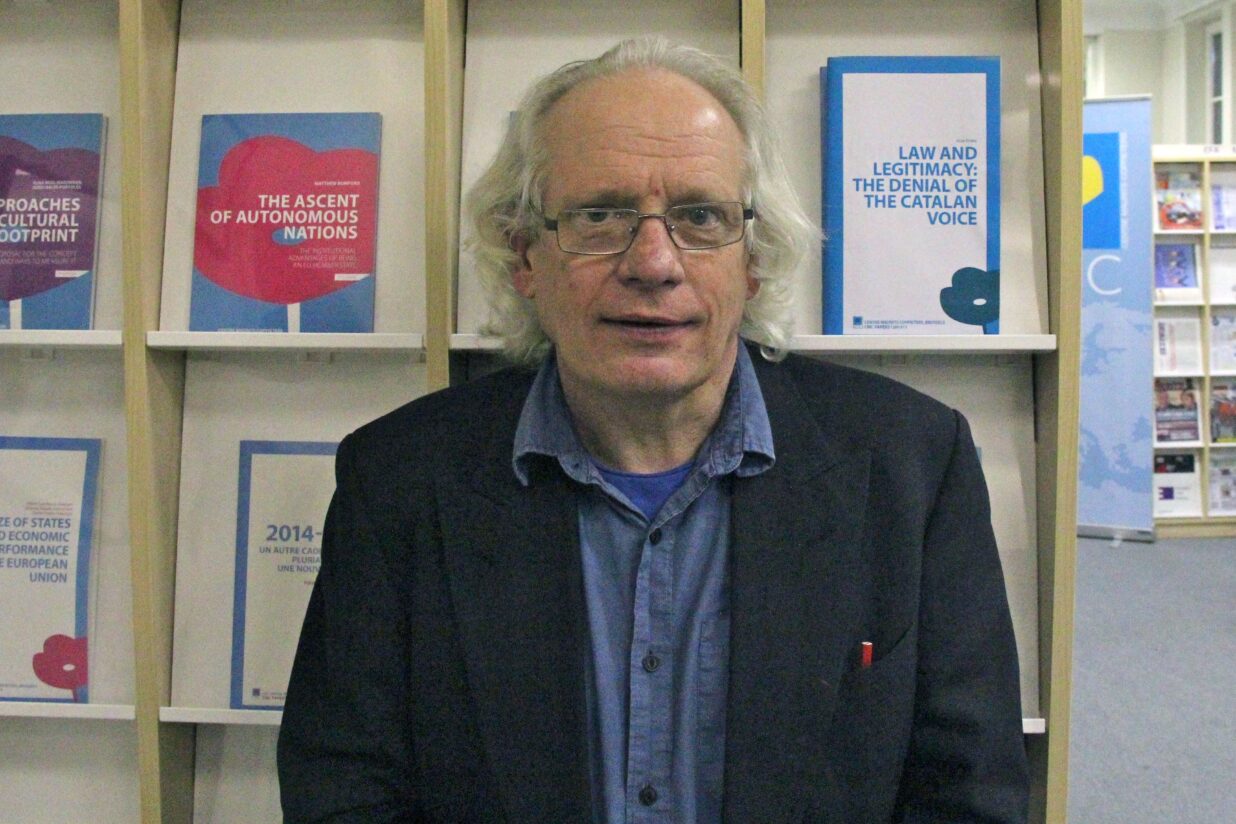09.01.2014 - 17:44
‘The Spanish Government is only considering the rule of law, as laid out in the Spanish Constitution, but it’s not taking into account democratic principles and that makes it lose all legitimacy,” declared Cardiff Metropolitan University Law Professor Huw Evans in this interview.
He is the author of the research paper, ‘Law and Legitimacy: The denial of the Catalan Voice’ (consult here) that was published by the Centre Maurits Coppieters, which has ties to the European Free Alliance, in which he compares the convocation of the Scottish and Catalan referendums with the Quebec Case. Evans is convinced that the legitimacy of the Spanish political system is under threat because the Spanish government is sticking to the literal text of the Constitution instead of the principles on which it is based, as was proposed by the ruling of the Supreme Court of Canada, in 1998, on the secession of Québec. Evans began to be interested in the Catalan and Quebecker cases in 1998 when he was working for the British Government and he set up the National Assembly of Wales after the devolution referendum in 1997.
-You say that the only thing that the Catalan and Scottish cases have in common is that the two nations plan on holding a referendum on independence in 2014.
-That’s right. and I also say that the most important difference is without a doubt the legal status of both referendums. In the UK, there is no Consitution and the Parliament has the power to make and unmake laws. In stark contrast, the Spanish Constitution limits the possibilities: it recognizes Catalonia as a part of Spain but at the same time restricts its right to separate. The law is thus completely different in each case.
-In contrast, you say that the Catalan situation is more similar to the Quebecker one with respect to the legal issues.
Yes, the case of Quebec, which has already held two referendums on independence, is very similar because the Canadian Constitution, like the Spanish, does not allow the unilateral separation of Quebec. But, the Constitutional Court of Canada resolved in 1998 that the referendum had to be allowed because, beyond the literal text, the Constitution was based on foundational principles, like the rule of law and of democracy, and it’s necessary for the two to interact. That is, the court determined that the important issue was that the political system be legitimate, not just legally, but also democratically.
-And how does all that apply to the Catalan case?
-The ruling doesn’t say that the independence of Quebec has to be promoted but it determines that the citizens have to have a voice, they have to be able to decide how they want their future to be. If we apply that to the Catalan case, the referendum has to be able to be held. All in all, it shows that the Spanish government doesn’t respect the principle of democracy: it only takes into account the rule of law as framed by the Constitution, but it doesn’t take into account the democratic principles. By denying the Catalans the right to self-determination, the Spanish government violates basic universal principles like freedom of expression.
-The Canadian ruling, therefore, dictates that the referendum can be held without having to change the Constitutional text?
-Yes, because it takes into account the principles on which the Constitution is based, beyond the text itself: federalism, democracy, the rule of law, and the rights of minorities. If the first is not applicable to the Spanish Constitution, the other two are and have to be taken into account.
-Catalan President Artur Mas has said repeatedly that he will only proceed with the referendum within a legal framework. According to the Canadian ruling, would that be possible within the current Spanish framework?
-Of course. The ruling on Quebec dictates that the act of organizing a referendum is not illegal on its own, on the contrary. It says that it is a matter of democratic principles and that it is precisely the democracy that is baed on the guarantee of the right to decide. The Constitution cannot overrule democracy.
-Do you believe that this ruling can be used as an argument to shore up international support for the Catalan referendum?
-Yes, because it describes the exact solution needed to find the balance between the rule of law and democratic principles. Since the Spanish State does not allow the referendum, the State loses all political legitimacy, which is based on the rule of law, in this case the Consttution, but also on principles, in this case, of democracy. And the British case serves to illustrate this matter, because the devolution of powers, both in Scotland and in Wales, took place after the citizenry voted them in referendums.
-Can you imagine the Spanish Constitutional Court ruling in this direction?
-If it applied the same principles as the Canadian resolution, why not? In fact, I think that these are the principles that should be applied. It’s obvious that at this point, the principle of democracy, that includes the rights of minorities, is not applied in the Spanish State. Therefore, currently the political system lacks legitimacy.
-What’s the difference between the Canadian Constiutional Court and the Spanish one?
-Both are Constitutional Courts, I don’t see them as being very different. Both are there to defend their individual constitutions, human rights, and democracy.
-At any rate, the ruling is only applicable in Canada.
-Yes, but it can be used by the Catalans to say, “We are also human beings, organized democratically and we have too many things in common with the Quebeckers for this ruling to be ignored!”



